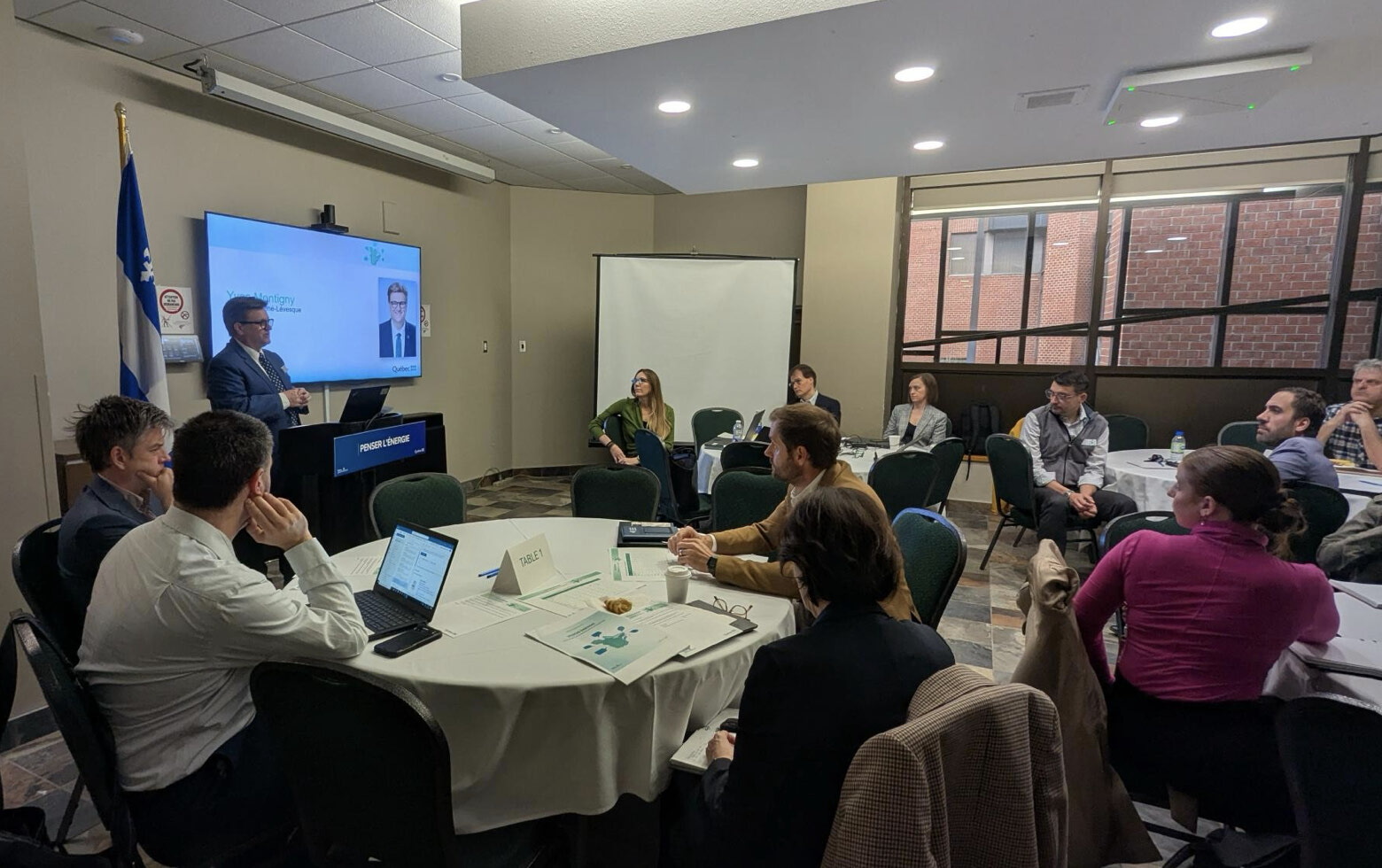
Stakeholders in Gatineau contributed local perspectives on Quebec’s proposed energy reforms during the Vision énergie tour, offering input on Bill 69 and raising concerns about privatization, energy equity, and Indigenous inclusion. Photo: Courtesy of the Cabinet de la ministre de l'Économie, de l'Innovation et de l'Énergie
Outaouais stakeholders weigh in on Quebec’s energy future
Tashi Farmilo
Stakeholders from across the Outaouais region met at Gatineau City Hall to weigh in on Quebec’s future energy strategy during a regional stop of the government’s Vision énergie tour, held on May 2. The consultation was led by Minister of Economy, Innovation and Energy Christine Fréchette and MNA Yves Montigny.
Sixteen participants took part in the half-day session, including representatives from Action Climat Outaouais, the Canadian Renewable Energy Association, the Algonquin Anishinabeg Tribal Council, the University of Quebec in Outaouais, Domtar, and the MRC des Collines-de-l’Outaouais. They brought perspectives from Indigenous communities, environmental groups, the energy sector, academia, and local governments to help shape the province’s long-term energy planning.
The event comes as Bill 69, An Act to Ensure the Responsible Governance of Energy Resources and to Amend Various Legislative Provisions, is under study in the National Assembly. The bill proposes far-reaching reforms to how Quebec manages its energy system, including the development of a Plan de gestion intégrée des ressources énergétiques (PGIRE), which would guide policy decisions over the next quarter-century. It also strengthens the minister’s role in energy planning and restructures the powers of the Régie de l’énergie.
While the government argues that Bill 69 is essential for coordinating a rapid and coherent energy transition, a broad coalition of civil society groups, unions, and environmental organizations has raised alarm over provisions they say could lead to the privatization of Quebec’s electricity system. The bill proposes to expand the role of private sectors in energy generation and distribution—sectors historically under the control of Hydro-Québec—and grants the Minister of Economy, Innovation and Energy new discretionary powers to approve projects and set priorities, bypassing traditional regulatory oversight.
Groups such as the Syndicat canadien de la fonction publique (SCFP), the Association coopérative d’économie familiale (ACEF) du Nord de Montréal, the Front commun pour la transition énergétique, and the Réseau Québécois des groupes écologistes (RQGE) have warned that these changes could weaken public accountability and lead to higher electricity rates for consumers. They argue the bill risks concentrating decision-making within the executive branch, reducing transparency and democratic input in shaping Quebec’s energy future. Critics have also expressed concern that the bill does not do enough to guarantee the long-term integrity of Hydro-Québec as a public utility, nor to protect energy as a collective resource.
At the Gatineau session, participants engaged in workshops on energy demand and supply, providing input on topics ranging from decarbonization strategies for hard-to-electrify sectors to the need for decentralized production and energy storage solutions. There was broad consensus on the importance of involving Indigenous communities in energy development and maximizing the use of local renewable sources, including biomass and solar energy.
The plenary discussion underscored a shared desire for transparency and democratic oversight in the development of the PGIRE. Concerns were raised about ensuring equitable access to energy and avoiding decisions that disproportionately benefit corporate interests at the expense of community needs. Attendees also highlighted the potential of public transit, waste heat recovery, and regional autonomy in building a more resilient and sustainable energy network.
Minister Fréchette emphasized that the Vision énergie tour is intended to gather diverse perspectives that will inform the PGIRE. “We’re aiming to build an energy framework that reflects Quebecers’ values and supports a low-carbon, economically strong future,” she said. Montigny, who is responsible for coordinating the tour, said that hearing directly from regional sectors was crucial to developing a plan suited to the province’s energy and environmental challenges.
Quebec residents are invited to take part in the process through a participatory platform where they can vote on, comment, or suggest proposals for Quebec’s energy future: https://consultation.quebec.ca/processes/VisionEnergie/f/427/ .





